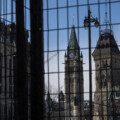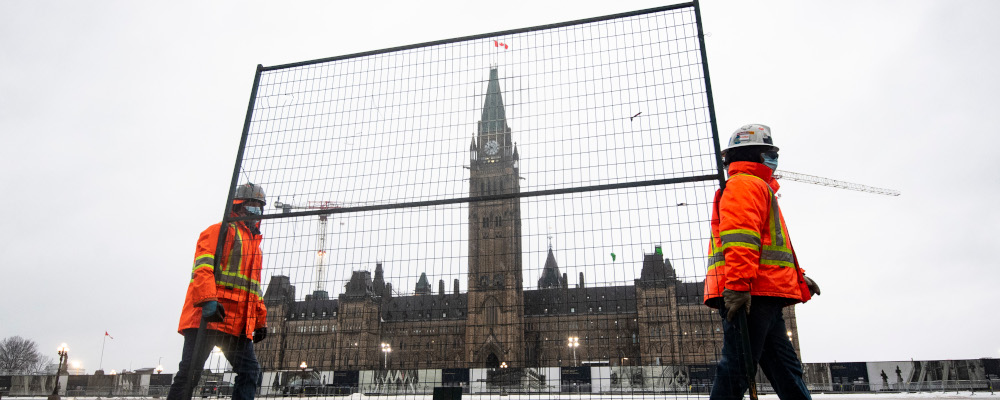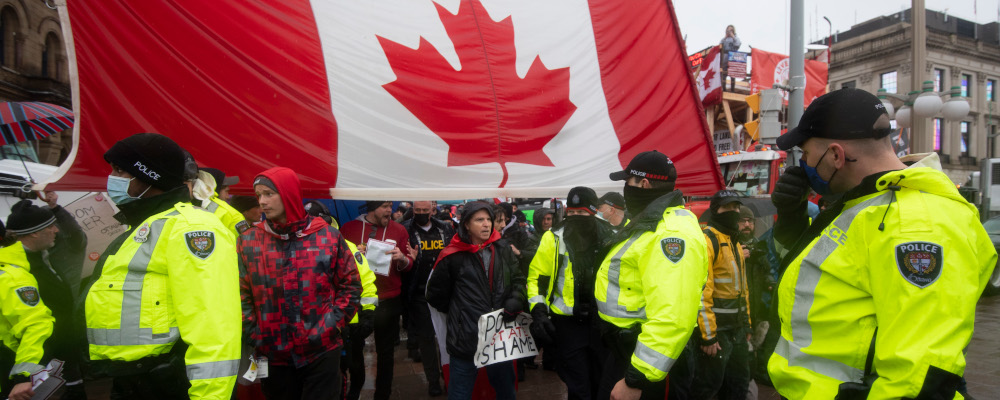Re: Declaration of Public Order Emergency
Dear Honourable Members and Senators,
We write to you as members of Advocates for the Rule of Law, a think tank composed of lawyers, scholars and engaged citizens dedicated to preserving the rule of law in Canada. The purpose of this letter is to set out the significant concerns we have with the Government of Canada’s declaration of a public order emergency on February 14, 2022, and to urge Parliament to revoke the declaration.
Even, and especially, in times of crisis, it is essential that members of the public be prepared to scrutinize executive and legislative action to ensure it conforms with the law. As Justice David Stratas of the Federal Court of Appeal has said, the best guarantee of a democracy is not judges or even Parliament, but ultimately a “well-informed, active populace that’s prepared to defend fundamental values.” It is in that spirit that we write to provide these hallowed chambers with our assessment of the lawfulness of the Government’s declaration.
The high hurdle of declaring a public order emergency
Pursuant to s.58(1) of the Emergencies Act (the “EA”), the Government has provided an explanation of its declaration of public order emergency (the “Explanation”). We do not contest any of the facts set out in the Explanation. We acknowledge that the blockades in Ottawa and at various ports of entry are unlawful, being both contrary to statutory law and court-ordered injunctions. We further acknowledge that these blockades do not constitute “peaceful assembly” under s.2(c) of the Charter of Rights of Freedoms. Finally, we acknowledge that the blockades and other actions taken by some of the protesters threaten Canada’s economic well-being and security. In short, we support the federal and provincial governments taking decisive action to end the blockades and restore order.
Any action taken by either order of government, however, must be in accordance with the law. The government, as the executive branch of the state, is duty bound to execute the laws the legislature has enacted in a manner that is faithful to the text, context, and purpose of those laws. Thus, a declaration of a public order emergency may only be made under the EA where the criteria of such an emergency are met.
A public order emergency is defined in s.16 of the EA as “an emergency that arises from threats to the security of Canada and that is so serious as to be a national emergency.” To this end, the burden rests with the Government to demonstrate, firstly, that there is an emergency arising from “threats to the security of Canada,” and secondly that the situation “is so serious as to be a national emergency.”
The term “threats to the security of Canada” is defined in section 2 of the Canadian Security Intelligence Service Act. That section enumerates four potential types of “threats to the security of Canada.” The Government has anchored its declaration to the third, which reads: “activities within or relating to Canada directed toward or in support of the threat or use of acts of serious violence against persons or property for the purpose of achieving a political, religious or ideological objective within Canada or a foreign state.” In essence, this is a threat akin to terrorism, and there must accordingly be evidence of a threat of “serious violence.”
Once the Government has demonstrated that there exist “threats to the security of Canada” it must then show that these threats rise to the level of a “national emergency”. For something to constitute a national emergency, two additional criteria must be met. First, pursuant to s.3 of the EA, there must be a situation that either “seriously endangers the lives, health or safety of Canadians and is of such proportions or nature as to exceed the capacity or authority of a province to deal with it,” or “seriously threatens the ability of the Government of Canada to preserve the sovereignty, security and territorial integrity of Canada.” The use of the disjunctive “or” means that the government can justify the invocation of the EA on either basis.
Secondly, to constitute a national emergency, the situation must be such that it “cannot be effectively dealt with under any other law of Canada.” The use of the conjunctive “and” in s.3 means that this is a separate condition that must be satisfied in order to classify the situation as a national emergency and thereby justify a declaration of emergency.
In sum, the Government of Canada must demonstrate three things to justify its declaration of a public order emergency: 1) that Canada faces terrorist-like threats of “serious violence” intended to achieve an ideological aim, 2) that the situation either exceeds the capacity or authority or a province, or seriously threatens the ability of the government to preserve the sovereignty, security and territorial integrity of Canada, and 3) that the situation cannot be effectively dealt with under existing laws. These are high hurdles to overcome, and purposefully so. Once an emergency is declared, the government has wide-ranging powers, all of which potentially threaten the rights and freedoms of Canadians. And while actions taken under the EA are of course subject to the Charter, that is cold comfort since by the time the Government’s conduct is judicially reviewed, much of the damage will have been done. The Government must therefore only invoke the Emergencies Act in the most extreme circumstances, with Parliament serving as the first and best check against potential overreach.
There is insufficient evidence of a public order emergency
Accepting the allegations and evidence set out in the Explanation, there remains, in our respectful view, an insufficient basis to support the Government’s declaration of a public order emergency.
With respect to “threats to the security of Canada,” the Explanation does not provide any evidence that there is a real risk of “serious violence” occurring. Indeed, the Explanation does not even allege that the situation is different from what has been widely reported in the public domain. The Explanation discusses what “may” happen, the “risk” of serious violence and the “potential” for terrorist attacks; but there is no evidence presented of a larger coordinated threat, and no allusion to sensitive intelligence informing the Government’s decision. It is also not clear why this threat of serious violence, if it does exist, has not yet manifested despite the passage of over two weeks since the protests began. On the contrary, the strength and intensity of the protests appear, by all accounts, to be diminishing.
Even if the Government can demonstrate that there exist “threats to security of Canada,” it must then overcome the second hurdle described above. The Explanation certainly makes a persuasive case that the blockades have undermined the security of Canada – to the extent we interpret that term broadly to encompass “economic” security. On the other hand, there is no serious allegation that Canada’s sovereignty as a state is under serious threat, let alone its “territorial integrity.” While the Explanation does not state this expressly, the Government appears to be justifying its actions on the basis of s.3(a) of the EA, namely that this threat “is of such proportions of nature as to exceed the capacity or authority of a province to deal with.” But in our respectful view, there is insufficient evidence to support this contention.
The Government’s Explanation asserts that there is “evidence of coordination between the various convoys and blockades.” However, there is no evidence offered that this is a nationally or centrally coordinated movement, and in fact the Explanation suggests the opposite – that the protests represent disparate interests with “varying ideological grievances”. The Explanation also notes that, under Ontario law, the province cannot compel tow truck drivers to provide assistance, and is also unable to cancel or suspend the insurance of out-of-province vehicles. While true, this speaks only to particular methods the Ontario government is unable to employ, not whether the province lacks the capacity to address the threat. Why is it necessary to compel tow truck drivers to provide assistance, and why is the provincial government not able to resolve the issue using other provisions in Ontario’s Emergency Management and Civil Protection Act? Why is cancelling the insurance of out-of-province vehicles necessary to resolve the crisis, and if it is, what is preventing the Ontario government from working with other provinces to accomplish this?
Even if the situation is so dire that federal assistance is necessary, the Government of Canada still needs to show that the crisis cannot be resolved using existing laws. The federal and provincial governments already have significant resources at their disposal to deal with the situation, only some of which have been marshaled thus far. By way of example, Ontario could call in the military to assist with maintaining order and the federal government could direct the RCMP to assist at ports of entry and in some parts of Ottawa (see s.5 of the Royal Canadian Mounted Police Act, which empowers the Government to direct the RCMP Commissioner). The Explanation argues that under existing laws, the Government cannot effectively stop the movement of funds to the protestors, but once again, it is not clear why taking this extreme action is necessary to end the blockades. Similarly, while Ottawa’s Chief of Police has said that recent police actions were made possible by the EA, this same outcome could have arguably been achieved through a robust application and enforcement of existing laws.
The failure of the government and police to enforce existing laws and court orders is not a sound basis to expand state power with a declaration of a public order emergency, when no such emergency has been proven to exist. One rule of law failure should not beget another.
Finally, even if there was a need to declare a public order emergency on February 14, that need has now clearly passed. The last two weeks have demonstrated that the provinces, working together with the RCMP, are generally capable of ending the blockades when existing laws are enforced. Ports of entry have been reopened and order has largely been restored in downtown Ottawa.
Avoiding a dangerous precedent
Maintaining this declaration of emergency will endow the Government of Canada with far-reaching powers and it will set a dangerous precedent. If the Government can declare an emergency based on these facts, then it will also be able to do so the next time there is a railway blockade, a threat to pipelines or any other endangerment of national infrastructure. To be sure, each of these is a serious situation that calls for decisive action. But normalizing the declaration of emergencies, especially before other less intrusive (but still significant) measures have been attempted, threatens to render hollow the rights and freedoms guaranteed to all Canadians; it risks a gradual erosion of Parliament’s role in favour of executive power; and it amounts to a damning admission of a failure of state capacity. If Canada is to remain a functional and free democracy, then it must be able to solve problems using existing laws and established institutions, and without resorting to the most extreme measures except where absolutely necessary.
We want to emphasize that our assessment is based on the evidence and allegations contained in the Government’s own Explanation. To the extent the Government is in possession of sensitive intelligence signifying a larger coordinated threat likely to manifest, we would urge the Government to share this intelligence with key Members of the Opposition in confidence and we would urge those Members to consider that evidence and the Government’s assessment of it in good faith. A national emergency should not be a partisan issue, and we would hope that all Members of Parliament would be prepared to work together, lest invocations of the EA become commonplace, and even weaponized.
But to the extent the Government of Canada has no further evidence of a public order emergency beyond what it has already presented in the Explanation, we would respectfully urge all Members and Senators to vote to revoke the declaration of emergency. The rule of law demands no less.
Sincerely,
Asher Honickman, Partner, Jordan Honickman Barristers
Dwight Newman, QC, Professor of Law, University of Saskatchewan
Mark Mancini, PhD Student in Law, University of British Columbia
Ben Woodfinden, doctoral candidate, McGill University
Geoffrey Sigalet, Assistant Professor of Law and Politics, University of British Columbia
Justin Anisman, Lawyer
Recommended for You

The Weekly Wrap: It’s time to cut through Chesterton’s Fence and implement sweeping reform in Canada

Has the Left lost its masculine energy?

The Week in Polling: Young Canadians delay milestones due to high costs, Liberals lose the youth vote, and most Canadians fear a Trump-Vance White House

Ginny Roth: J.D. Vance, Pierre Poilievre, and how they slice their economic pie








